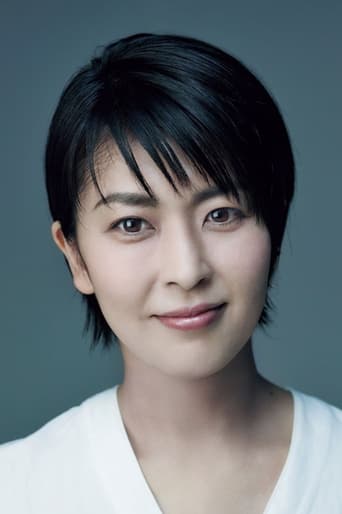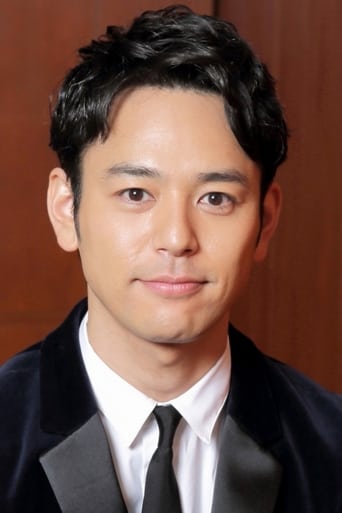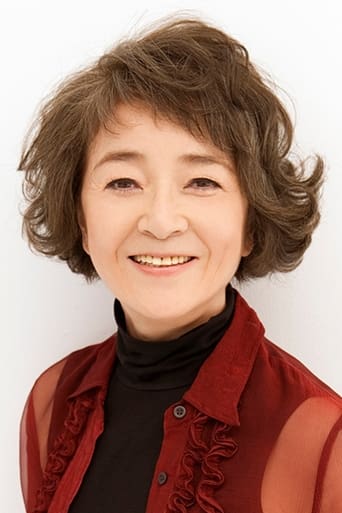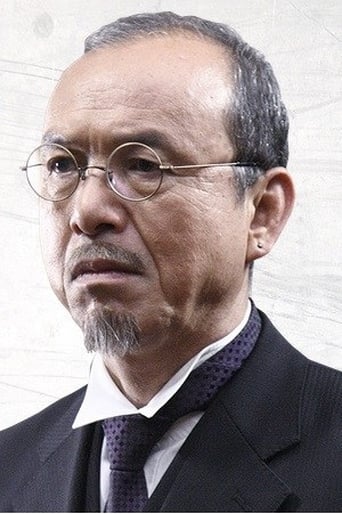Vashirdfel
Simply A Masterpiece
Greenes
Please don't spend money on this.
Sexyloutak
Absolutely the worst movie.
Cheryl
A clunky actioner with a handful of cool moments.
WILLIAM FLANIGAN
Viewed at CineMatsuri 2015. Veteran Director Yoji Yamada provides a heart-wrenching story that moves back and forth over an 80 year span that he knows well, since he has lived through it! Painfully sad overall, but not maudlin, the film employs a conventional plot scenario: the recent discovery (with frequent surprises) of a diary written over many past decades by a recently deceased family member. In the hands of Master Director Yamada, this common story vehicle makes for a most uncommon photo play. It is a gripping (the viewer can not escape being pulled in--resistance is, indeed, futile!), emotionally jarring tale of an upper middle-class family that lived prior to WWII and died during the war (as "collateral damage"), and the pivotal role played by the family's maid who has survived (by leaving Tokyo in time), and, of course, is the diary's author. Most of the story takes place in a (relatively) little house on a hill in exurban Tokyo. It has a distinctive red-tiled roof, hence, is often referred to as the "little red house" through out the film. Direction is outstanding, and so is most of the acting. Actress Takako Matsu delivers a consummate performance as the bored and frustrated housewife. Cinematography (1.78 aspect ratio, color), lighting, and set design/decoration are excellent. Music lief motif is a bit on the French side, but quite good. Subtitles are often long, but linger sufficiently to be read without distracting from scenes. However (and regrettably), only above-the-line names are translated in the credits. Highly recommended. WILLIAM FLANIGAN, PhD.
Kicino
As an old woman composed her memoir of her early days as a domestic helper in Tokyo during the Second World War, her grandnephew discovered a long hidden secret which could change his outlook of life. The Little House is a great movie. It is warm and sad but fun. It scores on all counts: plot, script, acting and artistic direction. Nostalgically weaving in historic facts of the Sino-Japanese War in the 1930s to 40s, it is enjoyable while educational. I particularly like it contrasting grandaunt's memories with contemporary interpretation of facts so the audience can see both side of the same coin. The film starts with Taki (Haru Kuroki), a teenager from the snow-ridden Northeast Japan arriving at Tokyo to work as a domestic helper in 1936. While she lived comfortably and works hard at the Hirai family in the little house, Japan invaded China and started the Nanking massacre. But in Taki's sheltered life in the little house under the red tiles, her employer Mrs Tokiko Hirai (Takako Matsu)'s love life caused the young woman great turbulence and struggle. The artistic direction is excellent: to make it authentic, educational and nostalgic, the director Yoji Yamada throws in ration, marketing, manufacturing, black market of donkatsu (fried pork chop), omiai (match making), domestic helper, polio, new year celebration etc. to contrast between old and modern times, as well as war and peace time which makes the movie experience very enjoyable. But that's probably the original ideas of the novel writer Kyoko Nakajima who told the audience at a Hong Kong Book Fair seminar that she wanted to depict life in Tokyo during the war. The script and plot is what drive the movie. Looking at a well off family from the perspective of a loyal and industrious young domestic helper, we get a certain kind of objectivity while understanding the emotions of the various characters. We followed Taki into the Hirai family and learnt early on that a good helper's job is to keep the master's family intact.Obviously it is an anti-war movie where the author and director present through ordinary people's lives: Mr Hirai (Takataro Kataoka) and his colleagues from a toy company were more concerned with making and selling toys to Asia than understanding why Japan entered the war. The women are more interested in the butter sale which was set up to celebrate the capture of Nanking. There is a certain kind of parallel irony both in the war and how it affected ordinary lives. Very interesting contrast of historic events and their interpretation among laymen. In the core of all these, beautiful housewife Tokiko and her husband's young colleague Itakura (Hidetaka Yoshioka) found they had more in common such as music and movies and he offered more protection than her husband could.In the award-winning novel based on which this movie is made, the much older Mr Hirai is Tokiko's second husband. No wonder I kept wondering why this couple got married in the first place. It is also very possible that they did not have intimacy in their marriage. Therefore it became natural that Tokiko and Itakura felt for each other. But in those days, people tended to repress their feelings and oblige to social norms. Little Taki felt her mistress' affection for her handsome lover but also heard gossips from other people. She could not directly warn her master or mistress and could only bottle herself up. But the tension cannot be held when she knew the mistress is going to see her lover before he left for the war. She made an executive decision that could cause sadness and perhaps regrets on all parties.In her little but powerful way, Taki probably changed the fate of the couple but she kept the integrity of the Hirai family, who lived in a house she herself loved so much that she considered it her home and was reluctant to marry off herself. What is amazing is that she kept this secret all her life. Chieko Baisho made an excellent portrayal of an old lady recounting her glorious and bitter-sweet days. No wonder she said she lived for too long: it was prolonged suffering in keeping a long-held secret; she might feel guilty of destroying a beautiful and genuine love relationship; she might also thought she should be the one who died young because she has no one to love or be loved. She might feel her mistress loved and was loved and deserved to live long to enjoy this love. Even though Taki might think she did the right thing at that time, over the course of her life, she probably gradually realize the consequence of her action and her guilt and regret built up. It resonates so much to real life: we can only make decision based on the current situation and our expectation. But things always happen beyond our control and there always is no turning back and we just have to live with our decision.I totally enjoy this movie. It offers a glimpse into ordinary Japanese life during the WWII and portrays the absurdity of war as it ruins business, family and peaceful life. Comparing to Natsume Soseki's Sorekara, Tokiko and Itakura are braver in pursuing their love. I wonder how their affairs would evolve if there had not been a war. Even Tokiko's son seems to like Itakura. The direction and tempo is smooth. All the cast are excellent. Haru Kuroki is low-key yet powerful. Takako simply glows in her beautiful and slightly spoiled character. The Eternal Zero, another Japanese movie to condemn war, is shown around the same time but I like the Little House much more. There are more layers, more human, more sincerity, much better acting and much better script. Must see.
Harry T. Yung
Those familiar with Yoji Yamada's work will know what to expect from this, his latest work that won for Kuroki Haru the Best Actress Award in this year's Berlin Film Festival. Rest assured that these expectation will be fully met. There is again a wealth of delicate emotions and overflowing warmth. And then there is more.Film lovers can easily call up in their mind a list of works that have a house as a motif, a theme, or even the main character (yes, but unfortunately I can't remember this one's name). This house here is in bright red, glimmering like an exquisite gem on a ridge overlooking an interesting landscape somewhere in Tokyo. The main body of the story takes place in this house in a period of about 7 to 8 years, from the prelude of WW II to dropping of the atomic bombs. Expectedly this is from Japan's perspective. The perspective however is not from makers and shakers of events, but rather from that of everyday common folks the depiction of which Master Akira Kurosawa excelled in. Yoji Yamada has shown that he is equally deft in this.While the main story took place more than half a century ago, the movie actually starts with the present, and effortlessly glides seamlessly between two time frames which are just a few months apart: before and after the death (from old age)of an independent woman living alone, Taki (Baishou Cheiko). From both of these time frames, the audience is transported back to the main story via VOs, from two people. From after Taki's death, it is her grandnephew Takeshi (Satoshi Tsumabuki) looking over the things she left behind. From before her death, it is the two of them discussing her story in his effort to help her write her autobiography.The main story starts with young Taki (Kuroki Haru) leaving her home in desolate and poverty stricken northern Japan to seek a better life in Tokyo. In the titular house, as a servant girl, she is received with kindness by the young mother Tokiko (Takako Matsu) who treats her like a sister. Her main job is to look after 7-year-old (or thereabout) young master who soon get infected with polio. Through Taki's dedicated service that includes carrying the kid in a long walk to the masseur-healer daily and eventually learning to apply the message herself, he gradually recovers. This cements her relationship with the family.Let me turn to the macro scene for a moment. The head of the family (Tokiko's husband) is a typical businessman, something like a second-in-charge in a toy manufacturing firm. Entertaining colleagues (including the boss) in his house is not unusual. Yoji Yamada utilizes these occasions to paint a broad brush picture of the perspective of everyday businessmen during the period of Japanese aggression in WW II: they look at it as business opportunities, first and foremost. It isn't until towards the end of the movie that, through the words of the little boy who is now an old man on a wheelchair (the polio was healed, but never totally), that Yoji Yamada delivers the message of those who look back and finally see what atrocity they have been deceived by the militant government into condoning.Back to the intimate story, the real intrigue begins with a new colleague in the toy company appearing on the scene, a gentle soul of a young designer called Itakura (Hidetaka Yoshioka). As an affair develops between Itakura and Tokiko, it would seem at a quick glance that Taki makes up the third of a triangle. It is, and it isn't. Taki is not in love with Itakura, but jealous of him. While I confess readily to the guilt of putting this so bluntly, Yoji Yamada's handling of this is all gentle subtlety. We don't even need to affix a label. Call this an affection and warmth one woman feel for another that dances tantalizingly between admiration, romance and desire. Here, there is also loyalty.I cannot even begin to describe the layers and layers of subtle emotions that are bottled up in Taki. Maybe that is why young Kuroki Haru (born 1990) won the Berlin award while many thought it should have gone to Takako Matsu. And here is a Takako Matsu that you have never seen before, depicting such a wide range of emotions including amorous and bitchy (slightly so, I have to qualify). Not to be forgotten, however, is the third woman Baishou Cheiko who plays aged Taki so pitch-perfectly that she deserves to win the award just as much as the other two. Watch this movie. Take your pick.
rowerivers
Taki (Haru Kuroki) comes from northern Japan to Tokyo to join the Hirai household as a housekeeper. Back in the pre-war days the newly rich upper-middle classes built their own houses out in the suburbs, adopting Western style furnishings and fashions. And the Hirais built a very nice little house with a red roof. Taki quickly fits in and bonds quickly – too quickly – with Tokiko, the young wife and mother (Takako Matsu). She loves it so much there that she turns down an opportunity to marry into wealth. Husband (Takataro Kataoka) spends a lot of time at the office and traveling around for his toy company, which leaves plenty of time for Tokiko to pursue her own pleasures, like any decent housewife at that time. But it all changes when Itakura (Hidetaka Yoshioka), a young employee at husband's company, comes to visit. Tokiko is immediately attracted to him – he's handsome, cultured, artistic and a bit sickly – hitting all the right buttons for Tokiko. The feeling turns mutual as circumstances bring them together again and again. To Taki's dismay they begin an affair. This is where the film compares to Remains of the Day. Though the division between master and servant isn't as distinct in Japan, the housekeeper is still an employee, and the employee has to keep her own feelings to herself. Taki struggles with this as Tokiko becomes consumed and careless. Kuroki won the Silver Bear at the Berlin Film Festival for her performance, which was a surprise to many. But Kuroki beautifully portrayed Taki's struggle as the perfect world began to crumble. It is a too common Japanese theme: put on a brave front and never show your struggles. But in this film it's nicely presented.




